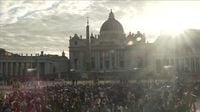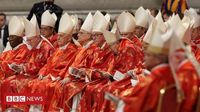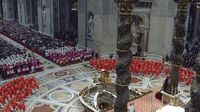The Vatican, the smallest country in the world, is currently under the global spotlight as cardinals gather to elect a new Pope following the death of Pope Francis. With a population of just 882 people, the Vatican is home to only 673 citizens, of which 458 reside within its 0.44 square kilometers. Established as a sovereign city-state in 1929 through the Lateran Treaty, the Vatican serves as the headquarters of the Roman Catholic Church and a global symbol of culture and faith.
The papal conclave commenced on May 7, 2025, with a solemn mass held in St. Peter's Basilica, where Cardinal Giovanni Battista Re prayed for the cardinals to be inspired in choosing a Pope that meets the needs of the contemporary world. The conclave, which will take place in the Sistine Chapel, is attended by 133 cardinals, who will swear to uphold the secrecy of the proceedings as they deliberate and vote on the next leader of the Church.
As the cardinals entered the chapel, they were reminded of the weight of their responsibility, with the specter of Pope Francis looming large. Having served for 12 years and appointed about 80% of the participating cardinals, Francis significantly reshaped the Church's direction, focusing on the marginalized and advocating for social justice.
During the first day of the conclave, the cardinals engaged in their initial voting session, which was expected to conclude around 7 PM local time. However, as the results came in, black smoke emerged from the chimney of the Sistine Chapel, indicating that no consensus had been reached on a successor. This outcome was anticipated, as the process of electing a new Pope often involves extensive negotiations and multiple rounds of voting.
The atmosphere in St. Peter's Square was electric, with approximately 50,000 spectators eagerly awaiting the signal from the smoke. While black smoke meant that the cardinals had not yet made a decision, white smoke would signify the election of a new Pope. The crowd's anticipation was palpable, with many expressing hope for a swift resolution.
In preparation for the conclave, measures were taken to ensure the confidentiality of the discussions. Signal blockers for cell phones were installed, and thousands of police officers and Swiss guards were deployed to maintain order. The cardinals are isolated from the outside world until a new Pope is elected, with no access to the internet, phones, or media.
The conclave is expected to follow a rigorous voting schedule, with two votes each morning and afternoon starting from the second day. If no candidate receives the required two-thirds majority after three full days of voting, the cardinals will take a day of prayer before continuing the process.
As the cardinals deliberate, they are acutely aware of the diverse needs facing the global Catholic community today. This conclave is notable for its unprecedented diversity, with representatives from regions such as Cape Verde, Haiti, South Sudan, Tonga, Myanmar, Papua New Guinea, and Rwanda present for the first time. This diversity reflects the Church's evolving landscape and the varying challenges it faces across different continents.
Discussions among the cardinals leading up to the conclave highlighted the need for continuity of Pope Francis's mission while also addressing the concerns of those who advocate for a more traditional approach. The balance between progressive reforms and conservative values is likely to shape the outcome of the conclave.
Among the favorites to succeed Pope Francis is Pietro Parolin, the Vatican's Secretary of State and a close associate of the late Pope. Other potential candidates include Pierbattista Pizzaballa, the Latin Patriarch of Jerusalem, and Luis Antonio Gokim Tagle from the Philippines, who is viewed as a natural successor to carry on Francis’s reforms.
As the cardinals prepare for the next round of voting, the world watches closely. The selection of the new Pope is not just a religious event but a moment that resonates across cultures and communities globally. The next leader of the Catholic Church will not only be a spiritual figure but also a head of state and a global influencer.
The conclave, steeped in tradition and solemnity, requires that each cardinal votes in the presence of God, with the results determining the future direction of the Church. The phrase "Habemus Papam"—meaning "We have a Pope"—will be announced from the balcony of St. Peter's Basilica once a new leader is chosen. Until then, the cardinals remain cloistered, engaged in prayer and deliberation, seeking divine guidance as they navigate this pivotal moment in Church history.






